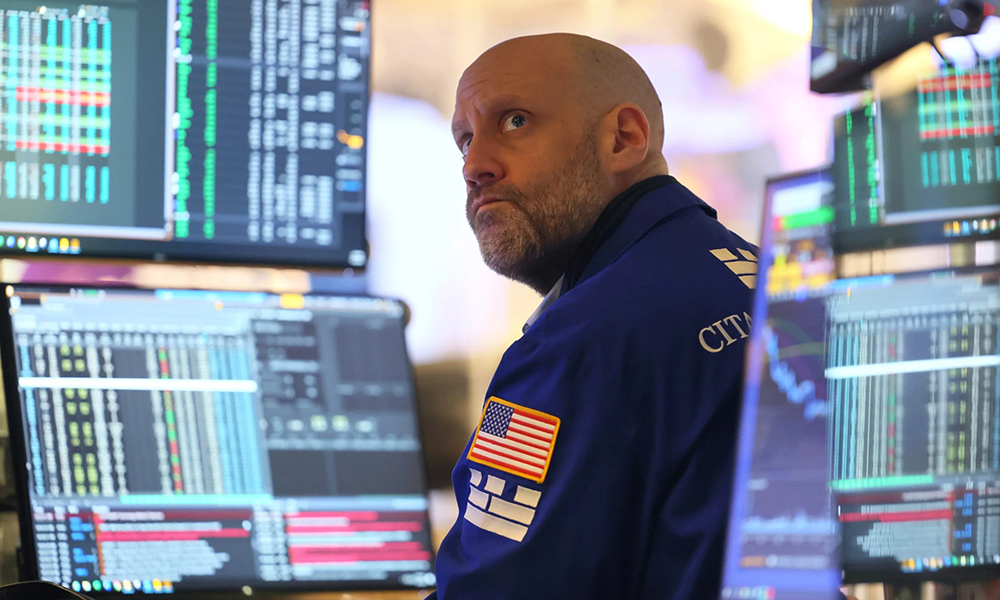
硅谷銀行(Silicon Valley Bank)和簽名銀行(Signature Bank)在今年3月早些時(shí)候突然倒閉之后,再加上上周瑞士信貸(Credit Suisse)不合時(shí)宜地陷入困境,,監(jiān)管部門和商界領(lǐng)袖都在努力向消費(fèi)者保證銀行是安全的,。美國(guó)聯(lián)邦存款保險(xiǎn)公司(Federal Deposit Insurance Corp.)、美聯(lián)儲(chǔ)(Federal Reserve)和美國(guó)財(cái)政部已經(jīng)聯(lián)手宣布,,為硅谷銀行和簽名銀行無(wú)保險(xiǎn)和有保險(xiǎn)的所有儲(chǔ)戶兜底,,因此目前危機(jī)在整個(gè)金融系統(tǒng)“蔓延”的可能性較小。
例如,,經(jīng)過(guò)美國(guó)史上規(guī)模第二大和第三大銀行倒閉案后,,美國(guó)財(cái)政部的部長(zhǎng)珍妮特·耶倫在上周對(duì)參議院金融委員會(huì)(Senate Finance Committee)的立法者表示,美國(guó)人可以“相信”存款的安全,。據(jù)路透社(Reuters)報(bào)道,,花旗集團(tuán)(Citigroup)的首席執(zhí)行官簡(jiǎn)·弗雷澤于3月22日告訴華盛頓特區(qū)經(jīng)濟(jì)俱樂(lè)部(Economic Club of Washington D.C.),銀行系統(tǒng)“依舊穩(wěn)健”,,大型銀行和區(qū)域銀行“資本充足”,,而且“沒(méi)有發(fā)生信用危機(jī)”。
硅谷銀行倒閉后不久,,瑞士信貸陷入困境,。當(dāng)時(shí),分析師認(rèn)為瑞士信貸丑聞纏身,,因?yàn)橹T多備受關(guān)注的問(wèn)題,,比如2021年的Archegos對(duì)沖基金爆倉(cāng)等,虧損已經(jīng)高達(dá)數(shù)十億美元,而且客戶和儲(chǔ)戶對(duì)瑞士信貸失去了信心,。他們表示,,硅谷銀行在風(fēng)險(xiǎn)管理方面犯下了致命錯(cuò)誤,,這些錯(cuò)誤本來(lái)能夠輕松避免,,但這并不代表整個(gè)金融系統(tǒng)的健康出現(xiàn)了問(wèn)題。
然而,,利率上漲不僅導(dǎo)致硅谷銀行大量無(wú)保險(xiǎn)的儲(chǔ)戶發(fā)生擠兌,,還使硅谷銀行產(chǎn)生了大量未實(shí)現(xiàn)損失。紐約大學(xué)(New York University)的研究人員在3月13日發(fā)表的一篇報(bào)告中指出,,存在未實(shí)現(xiàn)損失的不止硅谷銀行,,2022年年底,美國(guó)銀行的未實(shí)現(xiàn)損失達(dá)到1.7萬(wàn)億美元,。菲利普·施納貝爾教授和亞力克西·薩沃夫教授以及賓夕法尼亞大學(xué)(University of Pennsylvania)的伊塔馬爾·德雷克斯勒解釋稱,,這些未實(shí)現(xiàn)損失幾乎與這些銀行的2.1萬(wàn)億美元股權(quán)總額相當(dāng)。
持續(xù)加息導(dǎo)致美國(guó)國(guó)債和抵押貸款擔(dān)保證券貶值,,而這些資產(chǎn)在許多銀行占巨大比重,。在3月13日發(fā)布的另外一份報(bào)告中,多位高校研究人員發(fā)現(xiàn),,僅過(guò)去一年,,美國(guó)銀行的資產(chǎn)就貶值了10%。
此外,,報(bào)告顯示,,在美國(guó)銀行17萬(wàn)億美元的存款中,目前接近7萬(wàn)億美元沒(méi)有美國(guó)聯(lián)邦存款保險(xiǎn)公司的保險(xiǎn),。研究的作者包括南加州大學(xué)(University of Southern California)的姜雪薇(音譯),、美國(guó)西北大學(xué)(Northwestern University)的格雷戈?duì)枴ゑR特沃斯、哥倫比亞大學(xué)(Columbia University)的托馬斯·皮斯科爾斯基和斯坦福大學(xué)(Stanford University)的阿米特·塞魯,。他們解釋稱,,如果在最近銀行業(yè)的動(dòng)蕩之后,無(wú)保險(xiǎn)的儲(chǔ)戶決定取走資金,,可能就會(huì)有數(shù)千億美元的存款面臨危險(xiǎn),。
他們寫道:“即使無(wú)保險(xiǎn)存款擠兌迫使銀行小規(guī)模低價(jià)出售[資產(chǎn)],將有更多銀行面臨風(fēng)險(xiǎn),??傊@些計(jì)算結(jié)果表明,,最近銀行資產(chǎn)貶值大幅加劇了美國(guó)銀行系統(tǒng)的脆弱性,。”
危在旦夕
根據(jù)銀行的會(huì)計(jì)方法,銀行持有的資產(chǎn)按購(gòu)買價(jià)值記入賬目,,而不是當(dāng)前的市場(chǎng)價(jià)值,,因此銀行的資產(chǎn)負(fù)債表中不會(huì)體現(xiàn)未實(shí)現(xiàn)損失??屏_拉多州立大學(xué)(Colorado State University)的經(jīng)濟(jì)學(xué)教授,、區(qū)域經(jīng)濟(jì)發(fā)展研究所(Regional Economic Development Institute)的聯(lián)席所長(zhǎng)斯蒂芬·韋勒指出,當(dāng)銀行面臨擠兌,,大量?jī)?chǔ)戶紛紛提款時(shí),,銀行不得不出售資產(chǎn),這時(shí)這些損失就會(huì)變成已實(shí)現(xiàn)損失,。這就是硅谷銀行的遭遇,。儲(chǔ)戶大量要求取款,迫使其不得不出售抵押貸款擔(dān)保證券,,稅前損失達(dá)到24億美元,。
韋勒在3月23日對(duì)《財(cái)富》雜志表示:“只要儲(chǔ)戶不在同一天蜂擁取走存款,那就萬(wàn)事大吉,?!?/p>
以尼古勞斯·帕尼吉佐格魯為首的摩根大通(JPMorgan)分析師在上周稱,問(wèn)題是在硅谷銀行破產(chǎn)后,,“最脆弱的”美國(guó)銀行已經(jīng)被取走了1萬(wàn)億美元存款,。
韋勒警告:“因此銀行不得不面對(duì)這些未實(shí)現(xiàn)損失的可能性提高,”這可能引發(fā)更多銀行擠兌,。
面對(duì)美國(guó)銀行業(yè)存在的這個(gè)潛在問(wèn)題,,有多位政界人士,包括馬薩諸塞州參議員伊麗莎白·沃倫和加州眾議員羅·康納等,,都認(rèn)為美聯(lián)儲(chǔ)應(yīng)該為所有銀行的各類儲(chǔ)戶兜底,,以免發(fā)生更多銀行擠兌。據(jù)路透社報(bào)道,,3月22日,,美國(guó)財(cái)政部的部長(zhǎng)珍妮特·耶倫告訴參議院撥款小組委員會(huì),她并未考慮為美國(guó)所有銀行儲(chǔ)戶提供“全面保險(xiǎn)”,,除非真得出現(xiàn)“系統(tǒng)性風(fēng)險(xiǎn)”,。上周,要求美聯(lián)儲(chǔ)兜底的呼聲日益強(qiáng)烈,。
就連億萬(wàn)富翁對(duì)沖基金經(jīng)理比爾·阿克曼也在上周表示,,美國(guó)聯(lián)邦存款保險(xiǎn)公司應(yīng)該“止血”,并且“明確保證為所有存款提供擔(dān)?!?。
潘興廣場(chǎng)資本管理公司(Pershing Square Capital Management)的創(chuàng)始人阿克曼在3月22日發(fā)推文稱:“我們的立場(chǎng)已經(jīng)從含蓄地支持儲(chǔ)戶,變成了[耶倫部長(zhǎng)]今天明確提出的不考慮任何擔(dān)保?!彼f(shuō):“如果在短期內(nèi)不發(fā)生存款外流,,這才會(huì)讓我意外?!保ㄘ?cái)富中文網(wǎng))
譯者:劉進(jìn)龍
審校:汪皓
硅谷銀行(Silicon Valley Bank)和簽名銀行(Signature Bank)在今年3月早些時(shí)候突然倒閉之后,,再加上上周瑞士信貸(Credit Suisse)不合時(shí)宜地陷入困境,監(jiān)管部門和商界領(lǐng)袖都在努力向消費(fèi)者保證銀行是安全的,。美國(guó)聯(lián)邦存款保險(xiǎn)公司(Federal Deposit Insurance Corp.),、美聯(lián)儲(chǔ)(Federal Reserve)和美國(guó)財(cái)政部已經(jīng)聯(lián)手宣布,,為硅谷銀行和簽名銀行無(wú)保險(xiǎn)和有保險(xiǎn)的所有儲(chǔ)戶兜底,,因此目前危機(jī)在整個(gè)金融系統(tǒng)“蔓延”的可能性較小。
例如,,經(jīng)過(guò)美國(guó)史上規(guī)模第二大和第三大銀行倒閉案后,,美國(guó)財(cái)政部的部長(zhǎng)珍妮特·耶倫在上周對(duì)參議院金融委員會(huì)(Senate Finance Committee)的立法者表示,美國(guó)人可以“相信”存款的安全,。據(jù)路透社(Reuters)報(bào)道,,花旗集團(tuán)(Citigroup)的首席執(zhí)行官簡(jiǎn)·弗雷澤于3月22日告訴華盛頓特區(qū)經(jīng)濟(jì)俱樂(lè)部(Economic Club of Washington D.C.),銀行系統(tǒng)“依舊穩(wěn)健”,,大型銀行和區(qū)域銀行“資本充足”,,而且“沒(méi)有發(fā)生信用危機(jī)”。
硅谷銀行倒閉后不久,,瑞士信貸陷入困境,。當(dāng)時(shí),分析師認(rèn)為瑞士信貸丑聞纏身,,因?yàn)橹T多備受關(guān)注的問(wèn)題,,比如2021年的Archegos對(duì)沖基金爆倉(cāng)等,虧損已經(jīng)高達(dá)數(shù)十億美元,,而且客戶和儲(chǔ)戶對(duì)瑞士信貸失去了信心,。他們表示,硅谷銀行在風(fēng)險(xiǎn)管理方面犯下了致命錯(cuò)誤,,這些錯(cuò)誤本來(lái)能夠輕松避免,,但這并不代表整個(gè)金融系統(tǒng)的健康出現(xiàn)了問(wèn)題。
然而,,利率上漲不僅導(dǎo)致硅谷銀行大量無(wú)保險(xiǎn)的儲(chǔ)戶發(fā)生擠兌,,還使硅谷銀行產(chǎn)生了大量未實(shí)現(xiàn)損失。紐約大學(xué)(New York University)的研究人員在3月13日發(fā)表的一篇報(bào)告中指出,,存在未實(shí)現(xiàn)損失的不止硅谷銀行,,2022年年底,美國(guó)銀行的未實(shí)現(xiàn)損失達(dá)到1.7萬(wàn)億美元。菲利普·施納貝爾教授和亞力克西·薩沃夫教授以及賓夕法尼亞大學(xué)(University of Pennsylvania)的伊塔馬爾·德雷克斯勒解釋稱,,這些未實(shí)現(xiàn)損失幾乎與這些銀行的2.1萬(wàn)億美元股權(quán)總額相當(dāng),。
持續(xù)加息導(dǎo)致美國(guó)國(guó)債和抵押貸款擔(dān)保證券貶值,而這些資產(chǎn)在許多銀行占巨大比重,。在3月13日發(fā)布的另外一份報(bào)告中,,多位高校研究人員發(fā)現(xiàn),僅過(guò)去一年,,美國(guó)銀行的資產(chǎn)就貶值了10%,。
此外,報(bào)告顯示,,在美國(guó)銀行17萬(wàn)億美元的存款中,,目前接近7萬(wàn)億美元沒(méi)有美國(guó)聯(lián)邦存款保險(xiǎn)公司的保險(xiǎn)。研究的作者包括南加州大學(xué)(University of Southern California)的姜雪薇(音譯),、美國(guó)西北大學(xué)(Northwestern University)的格雷戈?duì)枴ゑR特沃斯,、哥倫比亞大學(xué)(Columbia University)的托馬斯·皮斯科爾斯基和斯坦福大學(xué)(Stanford University)的阿米特·塞魯。他們解釋稱,,如果在最近銀行業(yè)的動(dòng)蕩之后,,無(wú)保險(xiǎn)的儲(chǔ)戶決定取走資金,可能就會(huì)有數(shù)千億美元的存款面臨危險(xiǎn),。
他們寫道:“即使無(wú)保險(xiǎn)存款擠兌迫使銀行小規(guī)模低價(jià)出售[資產(chǎn)],,將有更多銀行面臨風(fēng)險(xiǎn)??傊?,這些計(jì)算結(jié)果表明,最近銀行資產(chǎn)貶值大幅加劇了美國(guó)銀行系統(tǒng)的脆弱性,?!?/p>
危在旦夕
根據(jù)銀行的會(huì)計(jì)方法,銀行持有的資產(chǎn)按購(gòu)買價(jià)值記入賬目,,而不是當(dāng)前的市場(chǎng)價(jià)值,,因此銀行的資產(chǎn)負(fù)債表中不會(huì)體現(xiàn)未實(shí)現(xiàn)損失??屏_拉多州立大學(xué)(Colorado State University)的經(jīng)濟(jì)學(xué)教授,、區(qū)域經(jīng)濟(jì)發(fā)展研究所(Regional Economic Development Institute)的聯(lián)席所長(zhǎng)斯蒂芬·韋勒指出,當(dāng)銀行面臨擠兌,,大量?jī)?chǔ)戶紛紛提款時(shí),,銀行不得不出售資產(chǎn),這時(shí)這些損失就會(huì)變成已實(shí)現(xiàn)損失,。這就是硅谷銀行的遭遇,。儲(chǔ)戶大量要求取款,,迫使其不得不出售抵押貸款擔(dān)保證券,稅前損失達(dá)到24億美元,。
韋勒在3月23日對(duì)《財(cái)富》雜志表示:“只要儲(chǔ)戶不在同一天蜂擁取走存款,,那就萬(wàn)事大吉?!?/p>
以尼古勞斯·帕尼吉佐格魯為首的摩根大通(JPMorgan)分析師在上周稱,,問(wèn)題是在硅谷銀行破產(chǎn)后,“最脆弱的”美國(guó)銀行已經(jīng)被取走了1萬(wàn)億美元存款,。
韋勒警告:“因此銀行不得不面對(duì)這些未實(shí)現(xiàn)損失的可能性提高,,”這可能引發(fā)更多銀行擠兌。
面對(duì)美國(guó)銀行業(yè)存在的這個(gè)潛在問(wèn)題,,有多位政界人士,,包括馬薩諸塞州參議員伊麗莎白·沃倫和加州眾議員羅·康納等,都認(rèn)為美聯(lián)儲(chǔ)應(yīng)該為所有銀行的各類儲(chǔ)戶兜底,,以免發(fā)生更多銀行擠兌,。據(jù)路透社報(bào)道,,3月22日,,美國(guó)財(cái)政部的部長(zhǎng)珍妮特·耶倫告訴參議院撥款小組委員會(huì),她并未考慮為美國(guó)所有銀行儲(chǔ)戶提供“全面保險(xiǎn)”,,除非真得出現(xiàn)“系統(tǒng)性風(fēng)險(xiǎn)”,。上周,要求美聯(lián)儲(chǔ)兜底的呼聲日益強(qiáng)烈,。
就連億萬(wàn)富翁對(duì)沖基金經(jīng)理比爾·阿克曼也在上周表示,,美國(guó)聯(lián)邦存款保險(xiǎn)公司應(yīng)該“止血”,并且“明確保證為所有存款提供擔(dān)?!?。
潘興廣場(chǎng)資本管理公司(Pershing Square Capital Management)的創(chuàng)始人阿克曼在3月22日發(fā)推文稱:“我們的立場(chǎng)已經(jīng)從含蓄地支持儲(chǔ)戶,變成了[耶倫部長(zhǎng)]今天明確提出的不考慮任何擔(dān)保,?!彼f(shuō):“如果在短期內(nèi)不發(fā)生存款外流,這才會(huì)讓我意外,?!保ㄘ?cái)富中文網(wǎng))
譯者:劉進(jìn)龍
審校:汪皓
After the rapid collapse of Silicon Valley Bank and Signature Bank earlier March, along with Credit Suisse’s untimely demise last week, regulators and business leaders have made it a point to publicly assure consumers that banks are safe. The potential for “contagion” throughout the financial system is now slim after the Federal Deposit Insurance Corp. (FDIC), Federal Reserve, and Treasury came together to backstop all depositors, both uninsured and insured, at SVB and Signature, they say.
Treasury Secretary Janet Yellen, for example, told lawmakers on the Senate Finance Committee last week after the second- and third-largest bank failures in history that Americans “can feel confident” about the safety of their deposits. And Citigroup CEO Jane Fraser told the Economic Club of Washington D.C. on March 22 that the banking system is “sound,” and both large and regional banks are “well-capitalized,” adding “this is not a credit crisis,” Reuters reported.
When Credit Suisse went under shortly after Silicon Valley Bank, analysts argued that it was a scandal-plagued institution that had racked up billions in losses from high profile issues—including the Archegos hedge fund implosion of 2021—and its clients and depositors merely lost confidence. And they note that Silicon Valley Bank made fatal, and easily avoidable, errors in risk management that aren’t indicative of the health of the overall financial system.
But SVB also suffered from heavy unrealized losses caused by rising interest rates that helped to trigger a bank run from its large base of uninsured depositors. And a new paper by researchers at New York University on March 13 found that they aren’t the only ones with these issues—U.S. banks had unrealized losses of $1.7 trillion at the end of 2022. The losses were nearly equal to banks’ total equity of $2.1 trillion, professors Philip Schnabel and Alexi Savov and the University of Pennsylvania’s Itamar Drechsler explained.
Rising interest rates have slashed the value of the U.S. Treasuries and mortgage-backed securities that make up a large portion of many banks’ assets. In another paper, also from March 13, university researchers found that U.S. banks’ assets have lost 10% of their value over the past year alone.
Additionally, of the $17 trillion in total U.S. bank deposits, nearly $7 trillion are currently not insured by the FDIC, according to that paper. The authors of the study—including University of Southern California’s Erica Xuewei Jiang, Northwestern University’s Gregor Matvos, Columbia University’s Tomasz Piskorski, and Stanford University’s Amit Seru—explained that if half of these uninsured depositors decide to withdraw their funds after the recent bank instability, it could put hundreds of billions of dollars of deposits in jeopardy.
“If uninsured deposit withdrawals cause even small fire sales [of assets], substantially more banks are at risk,” they wrote. “Overall, these calculations suggest that recent declines in bank asset values very significantly increased the fragility of the U.S. banking system.”
No fire without a spark
Unrealized losses aren’t reflected on banks’ balance sheets due to an accounting practice where assets are held on banks’ books at the value at which they are bought, instead of their current market value. And Stephan Weiler, an economics professor at Colorado State University and co-director of the Regional Economic Development Institute, explained that these losses will only be realized by banks if they are forced to sell their holdings amid a bank run where depositors withdraw their funds en masse. That’s what happened with SVB, depositors asked for the money back in droves, forcing the bank to sell its holdings of mortgage-backed securities at a $2.4 billion pre-tax loss.
“As long as people aren’t all coming in at the same time and demanding that their deposits back, you’re okay,” Weiler told Fortune on March 23.
The problem, JPMorgan’s analysts led by Nikolaos Panigirtzoglou noted last week, is that $1 trillion in deposits were pulled from the “most vulnerable” U.S. banks after SVB’s collapse.
“So the chances of facing those unrealized losses are going up,” Weiler warned, and that could lead to more bank runs.
As a result of this potential problem for U.S. banks, multiple politicians, including Massachusetts Sen. Elizabeth Warren and California Rep. Ro Khanna, have argued the Fed should backstop every type of depositor at all banks to prevent further bank runs from the public. And those calls intensified this week after Treasury Secretary Janet Yellen told the Senate Appropriations subcommittee on March 22 that she is not considering “blanket insurance” for all U.S. bank deposits, unless “systemic risk” becomes an issue, Reuters reported.
Even the billionaire hedge fund manager Bill Ackman said last week that the FDIC “stop the bleeding” and “explicitly guarantee all deposits now.”
“We have gone from implicit support for depositors to [Secretary Yellen’s] explicit statement today that no guarantee is being considered,” Ackman, who founded Pershing Square Capital Management tweeted on March 22, adding that he “would be surprised if deposit outflows don’t accelerate, effective immediately.”






